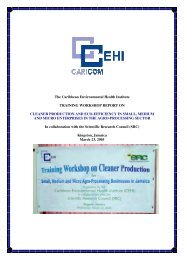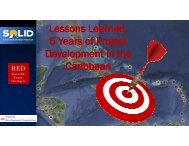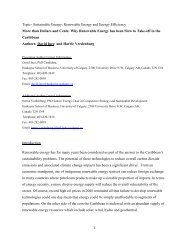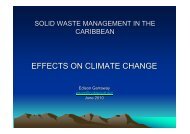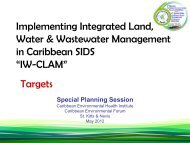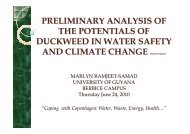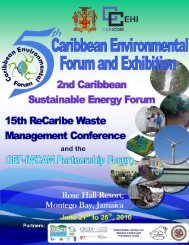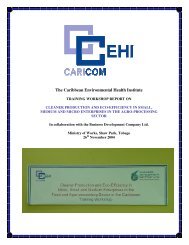A programme for Promoting Rainwater Harvesting in the Caribbean
A programme for Promoting Rainwater Harvesting in the Caribbean
A programme for Promoting Rainwater Harvesting in the Caribbean
You also want an ePaper? Increase the reach of your titles
YUMPU automatically turns print PDFs into web optimized ePapers that Google loves.
<strong>Caribbean</strong> <strong>Ra<strong>in</strong>water</strong> <strong>Harvest<strong>in</strong>g</strong> Programmecost of construction. For most potential homeowners this added cost is typically not factored<strong>in</strong>to new homes, and exist<strong>in</strong>g home owners are typically unwill<strong>in</strong>g to <strong>in</strong>vest <strong>in</strong> retro-fitt<strong>in</strong>g <strong>the</strong>irhomes with appropriate measures to capture ra<strong>in</strong>water, on account of cost. The publiceducation strategy must focus on consideration of <strong>the</strong> long-term advantages of RWH. While<strong>the</strong> <strong>in</strong>itial <strong>in</strong>vestment cost may be relatively high, particularly <strong>for</strong> lower-<strong>in</strong>come households,<strong>the</strong> cost of <strong>for</strong>ego<strong>in</strong>g <strong>in</strong>vestment can outweigh <strong>the</strong> <strong>in</strong>vestment <strong>in</strong> <strong>the</strong> long-term.The Programme will focus on <strong>the</strong> hospitality and o<strong>the</strong>r commercial sectors which consumelarge volumes of water <strong>for</strong> a variety of purposes. In many <strong>in</strong>stances <strong>the</strong>y utilize <strong>the</strong> potablesupply <strong>for</strong> non-dr<strong>in</strong>k<strong>in</strong>g purpose; <strong>in</strong> o<strong>the</strong>r words, us<strong>in</strong>g relatively expensive water <strong>for</strong> ‘low-end’uses. These low-end uses can be serviced by ra<strong>in</strong>water to some extent, whereby operators canrealize significant cost sav<strong>in</strong>gs, while contribut<strong>in</strong>g to water conservation particularly when <strong>the</strong>supply is under stress at peak demand dur<strong>in</strong>g <strong>the</strong> dry season. Investment <strong>in</strong> RWH not onlytranslates to direct cost sav<strong>in</strong>g to <strong>the</strong> user but contributes to cont<strong>in</strong>ued service provision whichis of direct economic <strong>in</strong>terest to service providers.To promote RWH as a viable augmentation measure <strong>for</strong> conventional potablenetworks <strong>in</strong> water-stressed areas, and promote water conservation In countries thatare predom<strong>in</strong>antly supplied by surface water <strong>the</strong> municipal water utility will typically rationwater supplies to particular communities dur<strong>in</strong>g <strong>the</strong> dry season with resultant <strong>in</strong>terruptions <strong>for</strong>portions of <strong>the</strong> day, and <strong>in</strong> extreme cases, <strong>for</strong> several days. The situation is worse <strong>for</strong>communities that are situated at <strong>the</strong> most distal ends of <strong>the</strong> water distribution network.Residents and bus<strong>in</strong>ess operators <strong>in</strong> <strong>the</strong>se areas familiar with <strong>the</strong> difficulties associated withwater shortages tend to be those most readily accept<strong>in</strong>g of implement<strong>in</strong>g RWH systems.The Programme will use such water-stressed areas as prime demonstrations, draw<strong>in</strong>g on <strong>the</strong>added dimension that some of <strong>the</strong> areas lie with<strong>in</strong> key touristic development zones, a sectorthat is becom<strong>in</strong>g <strong>in</strong>creas<strong>in</strong>gly important as a source of <strong>for</strong>eign exchange and <strong>in</strong>vestment <strong>in</strong>most <strong>Caribbean</strong> countries. Emphasis will be placed on general water conservation as part ofon-go<strong>in</strong>g education with all partners <strong>in</strong> <strong>the</strong> water sector.To foster best practices with respect to health and sanitationThe issue of sanitation needs to be addressed <strong>in</strong> two areas: (1) proper management ofcommunity RWH systems through regulated regimes and (2) encouragement of goodpractices at <strong>the</strong> <strong>in</strong>dividual household level.In some islands where communal RWH systems are employed such as Carriacou and PetitMart<strong>in</strong>ique, <strong>the</strong>re is a lack of a coord<strong>in</strong>ated framework <strong>for</strong> adm<strong>in</strong>istration of communitycatchment systems. It is <strong>the</strong> common perception that <strong>the</strong> systems are <strong>the</strong> responsibility of <strong>the</strong>State and that <strong>the</strong> State should take full responsibility <strong>for</strong> <strong>the</strong>ir operation and ma<strong>in</strong>tenance.Lack of State resources and low level of <strong>in</strong>volvement of communities <strong>in</strong> management<strong>in</strong>variably leads to a situation of poor ma<strong>in</strong>tenance with potentially serious healthconsequences.Private householders with homes equipped with RWH systems at times do not take <strong>the</strong>necessary measures to safeguard <strong>the</strong>ir water as it passes through <strong>the</strong> various components of<strong>the</strong> RWH system. Roofs and conveyance systems are sometimes not made of <strong>the</strong> appropriatematerials <strong>the</strong>reby <strong>in</strong>troduc<strong>in</strong>g possible contam<strong>in</strong>ants, and <strong>the</strong> cisterns or tanks may not be of21




